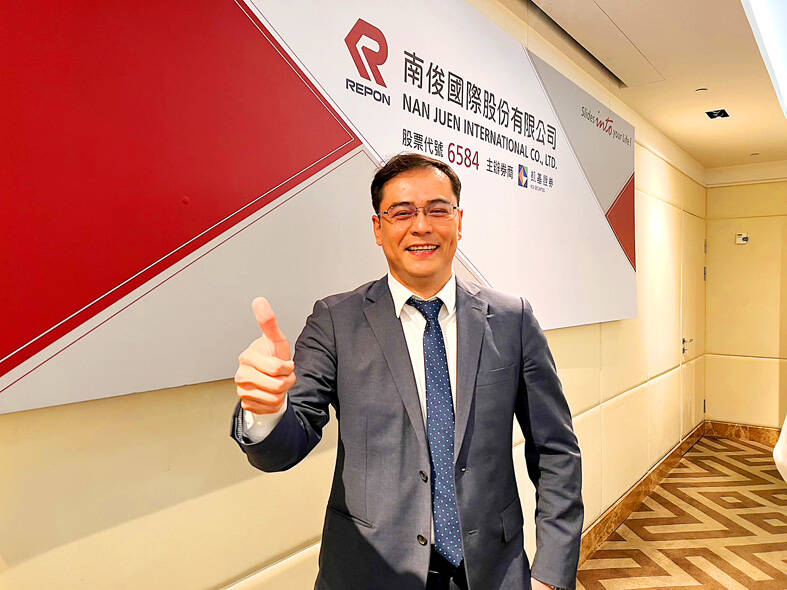Nan Juen International Co (南俊國際), which supplies rail kits used in servers, has entered the supply chain of Nvidia Corp by securing orders for the US chip giant’s GB200 artificial intelligence (AI) servers.
The Taoyuan-based company has obtained Nvidia’s recommended vendor list (RVL) certification and is expected to complete volume production preparations in the third quarter of this year, with initial shipments likely to begin at the end of this year or early next year, the company said at an investors’ conference in Taipei yesterday.
The server rail kit business is expected to make a larger contribution to the company’s revenue next year, Nan Juen said.

Photo: Lin Jin-hua, Taipei Times
The company also supplies rail kits for non-server applications, including office furniture, kitchenware, home appliances and tool cabinets.
In the first half of this year, server rails accounted for 34 percent of the company’s total sales, up from 27 percent at the end of last year, Nan Juen chief financial officer Vincent Jen (任忠仁) told investors.
Server rails are not something that always stand out or attract attention compared with other components, but they are necessary to ensure that servers can be easily installed, modified, maintained or, if necessary, replaced.
Nan Juen began cooperating with US-based Super Micro Computer Inc in 2002 for the mass production of server rails. It entered the data center supply chains of two major cloud service providers in the US in 2019 and 2022 respectively, a document released after the company’s earnings conference showed.
With the Nvidia deal, Nan Juen is to join King Slide Works Co (川湖科技) in becoming the second rail kit supplier for GB200 servers, and analysts expect the two companies to become primary server rail kit suppliers for the world’s major cloud service providers.
Nan Juen reported a net profit of NT$97.34 million (US$3.05 million) in the first half of the year, compared with a net loss of NT$25.47 million in the same period last year, on revenue of NT$905.81 million, a 56.3 percent increase year-on-year.
Earnings per share were NT$1.49 in the first six months, compared with losses per share of NT$0.42 during the same period last year, while gross margin improved 12.21 percentage points to 24.63 percent.
The company expects its business to steadily improve in the second half of this year, with growth momentum to strengthen further next year, it added.

South Korea’s equity benchmark yesterday crossed a new milestone just a month after surpassing the once-unthinkable 5,000 mark as surging global memory demand powers the country’s biggest chipmakers. The KOSPI advanced as much as 2.6 percent to a record 6,123, with Samsung Electronics Co and SK Hynix Inc each gaining more than 2 percent. With the benchmark now up 45 percent this year, South Korea’s stock market capitalization has also moved past France’s, following last month’s overtaking of Germany’s. Long overlooked by foreign funds, despite being undervalued, South Korean stocks have now emerged as clear winners in the global market. The so-called “artificial intelligence

‘SEISMIC SHIFT’: The researcher forecast there would be about 1.1 billion mobile shipments this year, down from 1.26 billion the prior year and erasing years of gains The global smartphone market is expected to contract 12.9 percent this year due to the unprecedented memorychip shortage, marking “a crisis like no other,” researcher International Data Corp (IDC) said. The new forecast, a dramatic revision down from earlier estimates, gives the latest accounting of the ongoing memory crunch that is affecting every corner of the electronics industry. The demand for advanced memory to power artificial intelligence (AI) tasks has drained global supply until well into next year and jeopardizes the business model of many smartphone makers. IDC forecast about 1.1 billion mobile shipments this year, down from 1.26 billion the prior

People stand in a Pokemon store in Tokyo on Thursday. One of the world highest-grossing franchises is celebrated its 30th anniversary yesterday.

Chinese artificial intelligence (AI) start-up DeepSeek’s (深度求索) latest AI model, set to be released as soon as next week, was trained on Nvidia Corp’s most advanced AI chip, the Blackwell, a senior official of US President Donald Trump’s administration said on Monday, in what could represent a violation of US export controls. The US believes DeepSeek will remove the technical indicators that might reveal its use of American AI chips, the official said, adding that the Blackwells are likely clustered at its data center in Inner Mongolia, an autonomous region of China. The person declined to say how the US government received